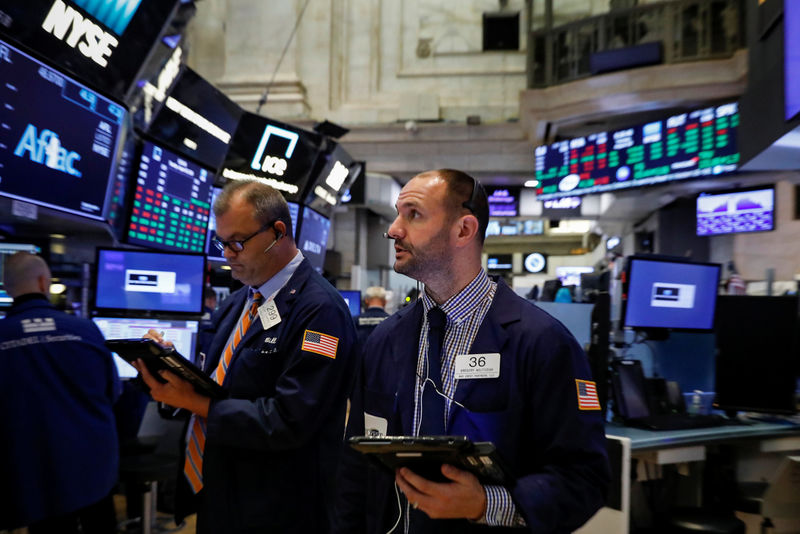By Claire Milhench
LONDON (Reuters) - Global investors raised their equity holdings to four-month highs in August, favoring Japan, a Reuters poll showed on Friday, with two-thirds also saying it was time to go back into emerging markets after another sell-off there.
Reuters' monthly asset allocation poll of 50 wealth managers and chief investment officers in Europe, the United States, Britain and Japan was carried out between Aug. 16-30, when global equities (MIWD00000PUS) rose to their highest in nearly six months.
Unsurprisingly, investors raised their equity allocation to 48.3 percent, the highest level since April. They cut bonds to 38.8 percent and cash to 5.2 percent.
They also reduced their emerging-market equity holdings to 11 percent from July's 12.2 percent and their emerging-market debt allocation by 1.9 percentage points to 10.2 percent after another sell-off across the complex.
MSCI's benchmark emerging equities index (MSCIEF) is set to end August down over 3 percent, having fallen over 9 percent so far this year.
Emerging-market currencies also took another pounding, with Argentina's peso
Yet 63 percent of poll participants who answered a question on the sector said it was time to buy emerging-market assets.
"As the threat of much higher rates and a much stronger dollar are largely behind us, this general repricing should be seen as an entry point (excluding idiosyncratic situations) for long-term investors," said Pascal Blanque, group chief investment officer of Amundi.
However, Michael Ingram, chief market strategist at WHIreland Wealth Management, remained cautious. He removed overweight emerging-market positions in his model portfolios months ago.
"EM credit spreads have moved up, but are still low on a multi-year basis. Any narrowing faces headwinds from the ongoing tightening of U.S. monetary policy and a firmer dollar," he said.
For stocks, he said, earnings momentum still seemed negative and unless there was a broader move by investors from growth to value, they were unlikely to outperform.
MASSIVE LOSSES
Investors were divided over whether the lira had reached a trough after plummeting more than 40 percent year-to-date. Some 45 percent of poll participants who answered a question on the currency said it had not yet bottomed out; 38 percent thought it had.
"Further massive losses in the value of the lira are almost inevitable if the central bank does not move toward a more restrictive course," said Jan Bopp, an investment strategist at Bank J Safra Sarasin. "But that will only become possible when (President Tayyip) Erdogan realizes that the markets leave him no other choice."
Other managers argued that poor liquidity over the summer had exaggerated the moves and calmer heads were likely to prevail after the holiday period.
Elsewhere, investors raised their Japanese equity holdings by 4.8 percentage points to 21.8 percent and their Japanese bond allocation by 2.6 percentage points to 16.7 percent - both the highest in at least five years.
"We like the valuations and favorable business cycle which supports the Japanese equity market," said Rory McPherson, head of investment strategy at Psigma.
Cedric Baron, head of multi asset at Generali (MI:GASI) Investments, added: "We think Japanese stocks will benefit longer than U.S. and Europe from their local central bank support."
The Bank of Japan has signaled that it will keep its super-easy monetary policy in place for an extended period.
The Nikkei <.N225> rose to its highest in over three months in August, lifted by a slight easing in global trade war worries and the yen's depreciation against the dollar.
CROWDED TECH
Asset managers trimmed U.S. equity exposure by 1.2 percentage points to 40.7 percent after raising it for four successive months.
U.S. stocks reached record highs in August and the S&P 500 (SPX) is set to end the month up 3 percent. The U.S. market was lifted by rallies in Apple (O:AAPL), which reached a $1 trillion stock market valuation, Amazon (O:AMZN) and Alphabet (O:GOOGL) .
Global tech stocks have been cited as the most crowded trade for months, but 68 percent of poll participants who answered a question on this did not expect a correction by year-end.
"The U.S. economy continues its progress toward late-cycle, where tech's low labor cost exposure, high margins and high cash balance should be supportive factors," said Justin Onuekwusi, a fund manager at Legal & General Investment Management.

But Christopher Peel, chief investment officer at Tavistock Wealth, said both U.S. and Asian tech giants had been in bubble territory for several months, and a meaningful correction was likely in the next six months: "The valuations of some of the large tech stocks are becoming harder to justify."